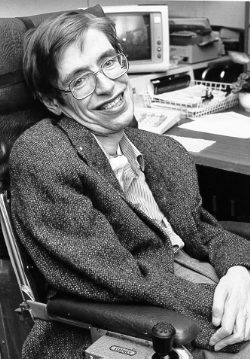Goodbye Stephen Hawking
March 22, 2018
The death of iconic British scientist, Stephen Hawking left not only the science community, but the world reeling on March 14th. At the age of 76, Hawking had succumbed to his disease, amyotrophic lateral sclerosis , or ALS, for a long period of his life when it was deemed that those who had such a disease would not live long.
It wasn’t until recently that it was shared that Hawking would have his ashed buried at Westminster Abbey Museum, along with other scientific legends such as Sir Isaac Newton and Charles Darwin.
Over the decades, Stephen Hawking had certainly made a name for himself; most notably, being known for his publications, and his Big Bang Theory.
A Brief History of Time, a 1988 publication by Hawking, talked about agnosticism, the universe, and cosmology-the study of the origin and development of the universe. It was such a high demand book and so well-liked by the masses that it had remained on the London Sunday Times’ best seller list for about three years.
In 2010, he published his book, The Grand Design, which became notable and controversial when he challenge the ideas of Newton about the existence of God, and his role in creating the universe. Hawking’s agnostic ideals made him popular as an author and scientist, but his struggle with ALS is what intrigued people the most.
I asked ERHS student Jordyn Dunn, what her thoughts were on the movie about Hawking and she said, “I thought The Theory of Everything (the 2014 biopic about Hawking’s relationship with then wife Jane Hawking) was a good movie. I love Eddie Redmayne, so I was really proud of him playing Stephen Hawking. And it really informed me about Hawing’s life living with his disease and I thought that was like really cool.”

After being diagnosed at 21, Hawking then decided to live life to the fullest. His disease is what ultimately pushed him into working harder towards his PhD, since he feared that he may not live long enough to earn it. Over the years, his disease would become increasingly worse: his legs were affected which left him to remain in a wheelchair, then he lost his ability to speak in the 1980s.
Despite his crippling disease, Hawking was able to have a family – a wife and three children- and show that life with ALS isn’t impossible. By then, doctors had believed that he had less than three years to live, but he pulled through. Hawking will forever be remembered as the great scientist that made contributions to the field of astronomy, physics, cosmology, and so many more. We can revel in the fact that he is now able to answer his own questions about the universe, and prove to us that there are no hurdles that you can’t jump through.


